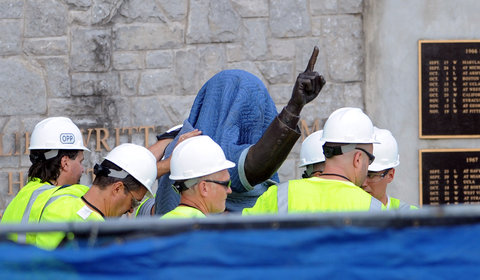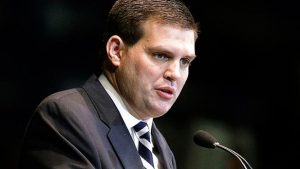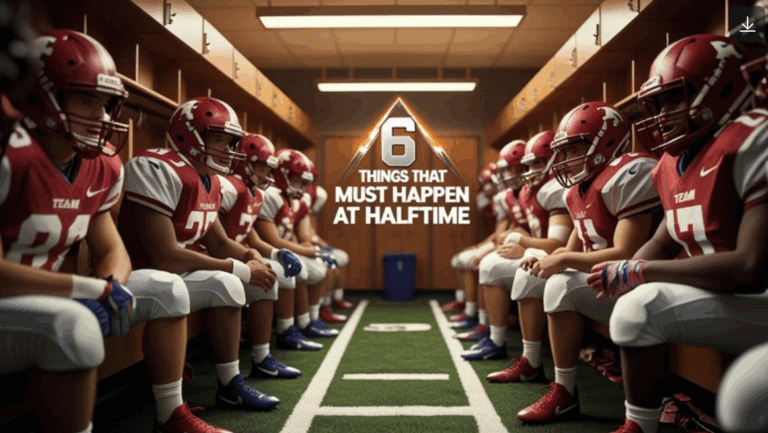
On October 29, 2011, Penn State was 8-1 and leading the Big 10 Conference. They were the only program in the country to win at least 77% of their games while also graduating 88% of their student-athletes.
Within a week and a half, Paterno was fired on the telephone without a conversation at all.
If a man with the reputation, adoration, respect, tremendous history and stature of Joe Paterno could be fired like that, so can Y-O-U.
This is not an article to defend Joe Paterno. This is about navigating a crisis. This is about YOU. This is about you being in the middle of a crisis, and how to go about handling that crisis. It might be a crisis that absolutely DESTROYS your career and your life, and you could be totally innocent. You’ll see why later.
——————————————————————————————————–
I had the opportunity to listen to Jay Paterno speak at the American Football Coaches Association convention in January 2017. It was a fantastic talk about Crisis Management.
As I tweeted out some of his statements and quotes and tips from that clinic, there were quite a few people who were jeering at the fact that someone from the Paterno family would be giving insight on Crisis Management. Those people who sent ridiculous tweets to me about that seminar are absolutely clueless in my opinion.
Who BETTER to talk about facing the storms and managing a crisis than someone from the Paterno family?
It doesn’t really need to be said, but obviously the crisis in the lives of these children who were molested by a former Penn State coach is the worst crisis from this entire situation. You can read more about that here.
Another crisis that came out as a result of that Penn State child sex abuse scandal was the career of one of the best football coaches of all time. The crisis was about what he did and didn’t know. The crisis was about his career. The crisis was about his life. It was a crisis about his legacy.

And YOU could be in the same boat someday. That’s why I wrote this. For you, the coach. For you, the teacher. Learn from this.
Here is a Head College Football Coach, one of the best of all time, who was fired without as much as a meeting to discuss what had transpired under his watch. If you remember watching that all unfold, it was a crisis. A severe crisis which ended up ending the career of one of the best coaches in any sport, ever.
Every mistake in 2017 is a story for the 24/7 news cycle.
Before you know it, your picture is plastered all over the media, by every outlet. The story can be completely FALSE. Just an accusation now can ruin the legacy, reputation and career of a coach before an investigation even starts!
Here are 6 lessons about how to handle a crisis. Let’s hope you never have to use them!
LESSON #1 – OPTICS ARE KING
A media narrative of how something looks, not how something really is reigns king.
Due process does not exist anymore because of the 24/7 news cycle that just wants clicks, views, likes and retweets!
LESSON #2 – YOU CAN’T BEAT THE VIDEO TAPE
We are a visual society. We want to see things. Take the JFK assassination for instance. How many times has that assassination been viewed online, in movies, on tv? Visual media is the most powerful form.
The Ray Rice case was resolved until the videotape came out. He hasn’t played a down of football since it was released. Video is king.
“Yeah but have you seen the video tape?”
Oklahoma running back Joe Mixon served a sentence for his 2014 crime of punching a woman. But then the video came out two years later. “Yeah but have you seen the video tape?”
When faced with a crisis, you will never, ever beat the video tape. This is why you must be realize that a video camera records everything you are doing in 2017. Every time you address your team as a coach, every time you’re at practice, at a game, teaching a lesson. Everything you do now can be recorded. And many times, the whole story is not shown on TV.
LESSON #3 – NEVER CONFUSE MEDIA WITH JOURNALISM
The media has the ability to find out what public thinks immediately.
A story breaks at the bottom of a webpage, then goes to the top as it spreads, and gets more popular. Then other outlets start to pick it up. If nobody cares about the story, it doesn’t go anywhere. But if it is getting clicks, it goes EVERYWHERE.
Writers have an agenda. Many times, they come to the story with a predetermined outcome, and a headline already written.
LESSON #4 – LIGHTING STRIKES THE TALLEST TREE
The interest of your career and the school’s reputation often splits when adversity hits.
The Head Coach’s name will get all of the eyeballs, more than the schools. All of the clicks will come because of the coach, not the school.
For instance, in one of the first stories about the Penn State controversy, the New York Times article mentioned Penn State, and Joe Paterno, but NOT the coach who had committed the horrible crimes.
Lightning strikes the tallest tree.

LESSON #5 – DEFENSE WINS CHAMPIONSHIPS
Do not act without counsel. Lawyers are important. Be clear when you use the office of legal counsel which the school may help to provide. Be clear that they are representing YOU, and not the university.
A lawyer usually simply can NOT represent the school AND the employee.
If the school is providing a lawyer, that lawyer is NOT going to work for you like they will work for the school. They will throw you under the bus fast, to protect the school.
LESSON #6 – HOW DO YOU SURVIVE THE MEDIA FIRESTORM AND CRISIS?
First of all, you’ve got to be prepared when you talk.
- Tell the truth, and nothing but the truth.
- If you don’t have all of the facts, it is okay to say that. Do not guess. If you are unsure, then say so. If you don’t know, don’t just wing it.
- There can be no audible at the line of scrimmage. You can’t shift gears. If you misstate something, that will be bad.
- Do not be afraid to ask for help.
- Keep answers short with taped interviews.
Scott Pelly asked Joe Paterno 10 questions. Paterno knew that they would probably only use two of them. He had to go 10 for 10 with his answers.
- Avoid qualifiers; these are two part answers. The media will usually cut those two part answers in half.
For instance, Joe Paterno said “With the benefit of hindsight, I wish I would have done more.”
But all that was reported from that answer was “I wish I would have done more.” The qualifying part of that statement was totally ignored. Paterno looked like a fool.
- Fight hashtags with hashtags. Avoid lengthy explanations in the media. Can I state my answer in headline form? The headline writer is now the most important person in the media room. It used to be the editor, now it is the headline writer because they get the clicks.
- Teamwork – As a coach, you have to answer to the Athletic Director. Work with them to formulate your response.
- Document everything! Document everything! Document everything! I can’t stress to you how important it is to write EVERYTHING down.
Chris Fore is a high school teacher, a junior college Special Teams Coordinator and an adjunct professor at Azusa Pacific University. He coached high school football in Southern California for 16 years, including 8 as a Head Coach. Fore consults college and high school coaches nationwide through his business Eight Laces Consulting. He is a speaker with the Glazier Clinics, a Coaches Choice author, and writes a weekly column for MaxPreps. Follow him on Twitter.





